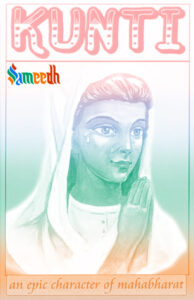In Hindu mythology, Kunti is a prominent figure known for her role in the epic Mahabharata. She was the mother of the Pandavas, the central characters in the Mahabharata, who were legendary warriors and key figures in the Kurukshetra War.

Kunti’s story begins with her being the daughter of King Shurasena and the sister of Vasudev, making her the aunt of Lord Krushna. She was adopted by King Kuntibhoja of the Kunti Kingdom, hence her name Kunti. Kunti was given in marriage to King Pandu of Hastinapur, making her the queen of Hastinapur.
After Pandu’s death, Kunti played a significant role in raising her five sons, the Pandavs: Yudhishthir, Bhim, Arjun, Nakul, and Sahadev. She faced numerous challenges and hardships throughout her life, including exile and the great war of Kurukshetra. Kunti was known for her wisdom, virtue, and devotion to her sons.
Kunti plays a significant and multifaceted role in the epic Mahabharat. Here are some key aspects of her role:
- Motherhood and Family Dynamics: Kunti is the mother of the Pandavs, the central characters of the Mahabharat. Despite facing numerous challenges and adversities, she is deeply devoted to her sons and plays a crucial role in shaping their lives. Her relationship with her sons, particularly with Yudhishthir, Arjun, and Bhim, is central to the narrative.
- Boon and Birth of Karna: Before her marriage to Pandu, Kunti received a boon from the sage Durvasa, which allowed her to invoke any deity and bear children by them. Out of curiosity, she invoked the Sun god, Surya, and gave birth to her first son, Karna. However, due to societal norms and circumstances, Kunti was compelled to abandon Karna, which becomes a significant subplot in the Mahabharat.
- Role in the Kurukshetra War: Kunti’s sons, the Pandavas, engage in a great war against their cousins, the Kauravas, over the rightful inheritance of the kingdom of Hastinapur. Throughout the epic, Kunti provides moral support to her sons and offers guidance during moments of crisis. Her advice, particularly to Yudhishthir and Arjun, often reflects her wisdom and understanding of dharm (righteousness).
- Exile and Trials: Alongside her sons, Kunti endures periods of exile and hardship, including living incognito in the kingdom of Virata. During these times, she maintains her composure and serves as a source of strength for her family.
- Final Years and Renunciation: After the Kurukshetra War, when her sons establish their rule, Kunti accompanies them to the forest during their retirement years. Eventually, she renounces the world and undertakes a spiritual journey, symbolizing detachment and transcendence.
Overall, Kunti’s character embodies various virtues such as devotion, sacrifice, and resilience. Her role as a mother, advisor, and moral compass contributes significantly to the rich tapestry of the Mahabharat narrative.
Kunti’s character is complex and multi-dimensional, embodying the ideals of motherhood, duty, and sacrifice. Her story is celebrated in Hindu mythology and serves as an inspiration for generations, showcasing the strength and resilience of a mother facing extraordinary circumstances.
